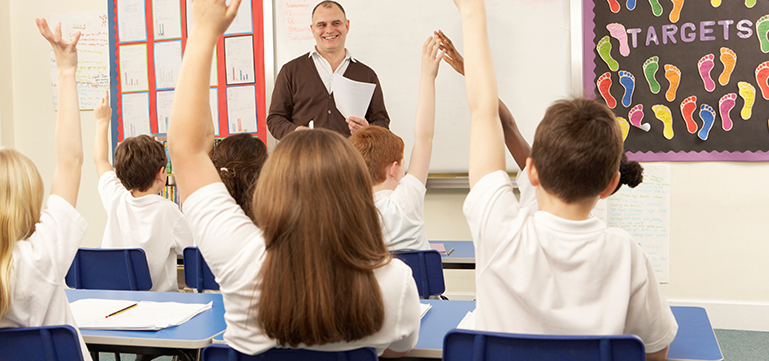Improving pupils’ wellbeing and attitudes to learning through curriculum enrichment

Quick links:
Maes yr Haul has had a strong track record of achieving high standards in information and communication technology (ICT), media and music, and has achieved many sporting successes.
The school motto, “Enriching life through lifelong learning” reflects its commitment to education as a tool for attainment and achievement, but also as a way of enriching children’s lives through developing the skills, attributes and positive attitudes to learning that children need to become ‘learners for life’.
School governors, leaders and staff all place a high value on the holistic development of each child, recognising the value of developing a broad range of skills, interests, and personal qualities as well as the more traditional academic subjects.
School leaders welcomed the ‘Successful Futures’ report regarding the new curriculum for Wales. They felt that the four core purposes were already reflected in the school’s existing good practice, and this gave them a strong starting point for moving forward.
Description of nature of strategy or activity
Empowered and inspired by the work towards the new curriculum, the school carried out a full audit of staff skills and interests, its curriculum planning, existing extra-curricular provision and partnerships with other providers. Leaders reorganised staff teams and responsibilities around the new areas of learning and experience and re-structured planning to provide a stronger focus on either science and technology, humanities or expressive arts each term. Teachers discuss intended topic outlines at the start of each term and pupils respond positively, suggesting ideas and collaborating to agree specific learning goals that they would like to achieve. Where the school did not have sufficient expertise amongst their own staff to provide high quality opportunities within areas of learning, such as the expressive arts, they negotiated agreements with providers such as the local authority music service, a local dance company and a graffiti artist.
The school introduced additional lunchtime and after-school clubs to extend the range of opportunities open to all pupils, including younger and more vulnerable pupils, and to encourage them to try new activities. These include learning about growing plants in the gardening club and developing computational thinking skills in the coding club.
Teachers organise family-sharing events to support the topics and key stage 2 teachers encourage pupils to plan and ‘bid’ for funding for projects, aiming to make a profit. These new approaches have contributed to a more integrated, ambitious and enriched curriculum, which supports pupils extremely well in developing important attributes such as self-confidence, persistence and the ability to plan and work co-operatively.
What impact has this work had on provision and learners’ standards?
The school’s use of external providers has raised standards and aspirations, and improved staff confidence and expertise. It has had a significant impact on pupils’ experiences. For example, this year, all upper foundation phase pupils have begun to develop an appreciation of music through learning keyboard skills; all junior pupils have performed in a samba band and over half of all junior pupils have sung or performed in musical events at either regional or national venues. The school choir performed at festivals in London and Paris and many pupils join the weekly extra-curricular ‘Glee’ club to rehearse for an end-of-year musical theatre production, attended by hundreds of family members.
The school recognises the importance of physical activity in developing pupils’ wellbeing. It gives a high status to sporting activities and offers experience of a wide range of different sports in physical education lessons and well-attended after school clubs. As a result, most pupils show a real enthusiasm for physical exercise. They develop good sportsmanship and improved fitness, and enjoy positive wellbeing. This contributes significantly to good behaviour and positive attitudes to learning in the school.
Through ambitious and imaginative curriculum activities, such as the school’s enterprise projects, pupils’ skills of collaboration, perseverance, confidence and creativity have greatly improved. They plan complex projects, consider financial implications and present creative ideas to audiences for ‘critique’. Pupils work well in teams and value greatly the meaningful input they have into decision‑making, including how to spend any profit made (this year, pupils decided to donate a portion of their profits to a charity). Through integrating learning across various curriculum areas in cohesive projects, pupils see a greater purpose and relevance in their learning, showing high levels of motivation and interest. The school sees that building positive partnerships with parents makes a crucial contribution to developing strong attitudes to learning, and sharing pupils’ learning experiences with parents is an important element of enrichment activities. Pupils take pride in sharing their achievements and are highly motivated to do the best they can. The strong link with families creates a warm learning community within the school.
How have you shared your good practice?
-
Variety of regular ‘family sharing’ events
-
Presentation to other schools through local authority festival of learning
-
Discussion between teachers of different schools
-
Video examples of practice on the school website